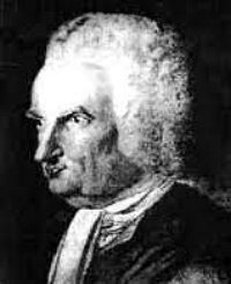James Burnett, Lord Monboddo (1714-1796)

James Burnett, more commonly known by his judicial title, Lord Monboddo, was born on 25 October 1714 at Monboddo in Kincardineshire in the North East of Scotland, a son of the Laird of Monboddo. He attended university in Aberdeen where he learned Greek from Professor Blackwell, famous for bringing about a revival of classical learning in the north of Scotland. Blackwell was an accomplished Greek scholar, but he tended to idolize the Greeks and dismiss everything as worthless that came after or was not based on Plato and Aristotle. This was a prejudice that Burnett imbibed and retained throughout his life.
After studying law in chambers in Edinburgh, Burnett spent time in the Netherlands studying Dutch jurists on Roman Law, where he also gained an enduring interest in folklore. He returned to Edinburgh in 1736, on a day that subsequently became notorious for the lynching of Captain Porteous, a man who had drawn public wrath by ordering his soldiers to shoot into a rioting mob. In 1737, he became an Advocate, but it was some years before his part is a high profile inheritance case gained him the political support that brought his appointment as a judge in 1767, a position in which he was better able to exhibit his undoubted legal abilities.
Monboddo was not a philosopher, nor, unlike his perpetual intellectual adversary, Lord Kames, was he much in sympathy with the intellectual ideals of the Scottish Enlightenment. However, at his home in the Canongate of Edinburgh he frequently hosted suppers which the Edinburgh literati – including the mathematician John Gregory, the historian William Robertson and the philosopher Adam Ferguson, regularly attended. Moreover, he was a prolific writer on intellectual subjects. Over a period of almost twenty years (1773-92) he published a six volume study of The Origin and Progress of Language. His second major project was of a more philosophical nature. Ancient Metaphysics also appeared volume by volume over twenty years (1779-99), the last volume being published just a few weeks before his death. In these volumes he drew on ancient metaphysics to counter both the philosophy of David Hume and the physics of Isaac Newton.
Monboddo gave lengthy expression to many eccentric ideas – that orangutans are human, and that men had tails until quite recently, are two of the most famous. His books did not attract much serious attention in their day, but some intellectual historians believe that The Origin and Progress of Language laid the foundations of comparative historical linguistics. Other commentators credit Ancient Metaphysics with anticipating in principle the idea of natural selection that Darwin subsequently developed.
Lord Monboddo was no less eccentric in person than he was in his speculative theories. He made several journeys to London – always on horseback even in old age – where he met Samuel Johnson. Initially relations were strained, but on their Scottish journey, Boswell and Johnson rode out from Aberdeen to Monboddo’s estate and warmed both to his generous hospitality and to his detestation of David Hume.
Enlightenment Philosophers
- Alexander Gerard ((1728-1795)
- Gershom Carmichael (1672-1729)
- Archibald Campbell (1691-1756)
- Francis Hutcheson (1694-1746)
- Henry Home, Lord Kames (1696-1782)
- Robert Wallace (1697-1771)
- George Turnbull (1698-1748)
- Thomas Reid (1710-1796)
- David Fordyce (1711-1751)
- David Hume (1711-1776)
- James Burnett, Lord Monboddo (1714-1796)
- Hugh Blair (1718-1800)
- George Campbell (1719-1796)
- William Robertson (1721-1793)
- Adam Smith (1723-1790)
- Adam Ferguson (1723-1816)
- John Millar (1735-1801)
- James Beattie (1735-1803)
- Dugald Stewart (1753-1828)
- Archibald Alison (1757-1839)